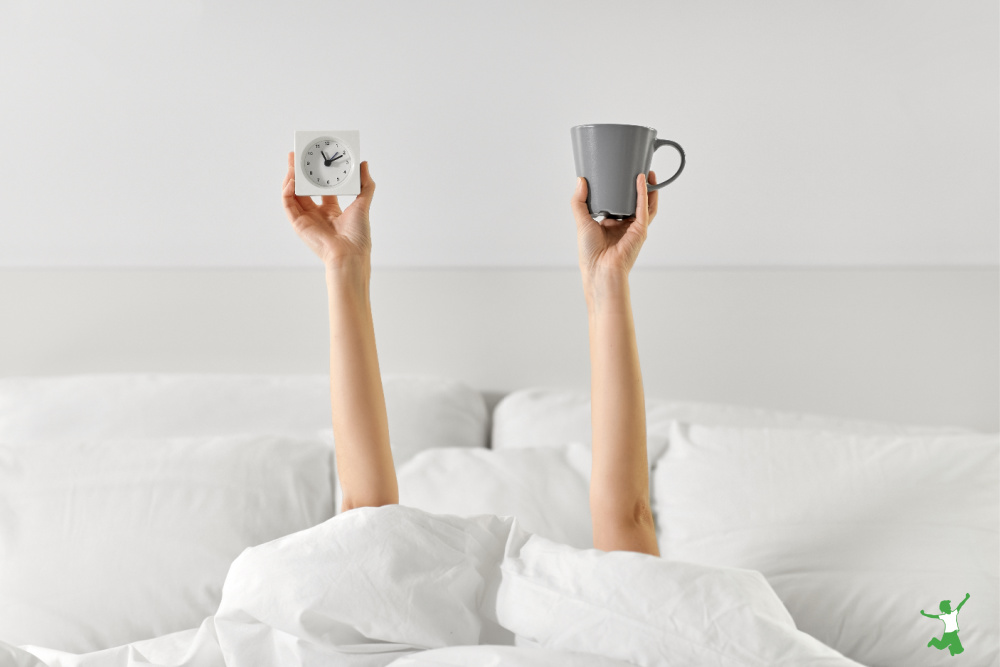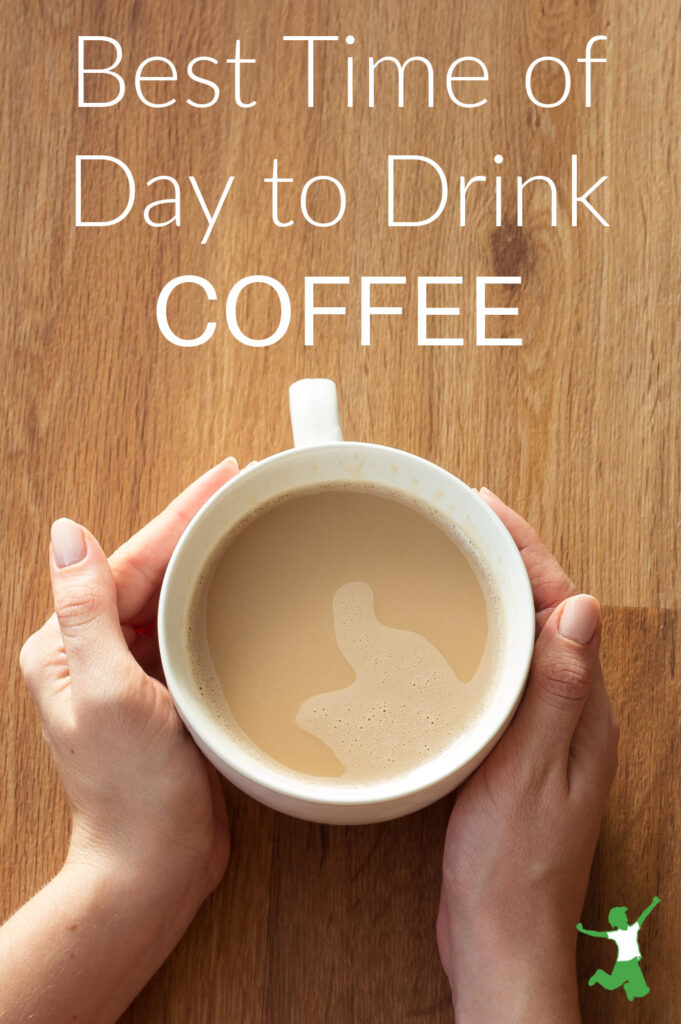Table of Contents[Hide][Show]
The best time in the morning to drink coffee to encourage the production of serotonin and maintain a balanced mood all day long.

I spent the entire first day at the International Wise Traditions Conference one year camped out in the room where Julia Ross was speaking.
Julia Ross is the acclaimed author of the books The Mood Cure and The Diet Cure.
It was my first opportunity to hear her speak, and I was not disappointed.
I took boatloads of notes that day and have enough material for several blog posts which I will write up in the coming weeks.
Today, however, I want to specifically address Julia’s discussion about coffee.
Julia Ross’ take on coffee is different from other speakers I have listened to before.
I wanted to share her warning about it because I think it’s something most coffee drinkers have no idea about.
Julia says that her main objection is that people drink coffee first thing in the morning when they get up. This typically results in skipping breakfast altogether because coffee is a strong appetite suppressant.
Not to mention that coffee reduces (not increases as popularly believed) blood flow to the brain by about 25%.
Worst Time for Coffee is First Thing in the Morning
Skipping breakfast is a big no-no and not just because it increases your chances of overeating especially starches and sugars later in the day.
Skipping your morning meal does a number on your body’s ability to produce the neurotransmitter serotonin which is derived from the amino acid tryptophan.
Tryptophan, like all the amino acids, is contained in protein.
Meat is the best source of tryptophan but only from animals roaming on pasture (corn contains almost NO tryptophan so don’t eat beef from corn fed cattle or eggs from primarily corn/soy fed chickens).
Protein (food) —–> Tryptophan (amino acid) —–> Serotonin (neurotransmitter) —–> Melatonin (hormone for restful sleep)
Serotonin is what helps you feel happy, calm, and self-confident even in the face of stress
. Moreover, ample serotonin is important for a restful night’s sleep as the body converts serotonin into melatonin at dusk. Inadequate melatonin results in insomnia problems.
Skipping breakfast in the morning short circuits the body’s ability to produce adequate serotonin throughout the day.
While eating protein later in the day definitely helps, your body still ends up playing serotonin catch up all day every day due to missing breakfast.
Julia says that we all need about 20-30 grams of protein 3X per day to fulfill our body’s requirement for amino acids in order to produce adequate neurotransmitters like serotonin.
If you are already deficient in serotonin, supplementation may be required for a short time to regain neurological balance.
This topic of neurotransmitters tends to get rather complicated, but the bottom line is this:
If you must drink coffee, then at the very least, wait until after breakfast to do it!
This way, the impact on your serotonin levels will not be as severe as drinking coffee first thing in the morning and skipping breakfast due to the appetite-suppressing effects.
You may find that this one simple change alone will help balance emotions the rest of the day.
Feelings of happiness, emotional flexibility, and stress reduction are common once this simple change is made.
How to Replenish Serotonin
Do you suspect that your serotonin levels are in the tank and you need neurotransmitter supplementation?
Clues would be that you grapple with worry, anxiety, OCD thoughts or actions, depression, panic attacks, and/or chronic insomnia.
In that situation, Julia Ross recommends this dosage with the amino acid tryptophan:
- 5-HTP (suggested source): 50 mg in the mid-afternoon and before bedtime.
OR
- L-tryptophan (suggested source): 500 mg in the mid-afternoon and again before bed especially if insomnia is a problem.
Note that 5-HTP is cheaper than L-tryptophan but some people get nausea from it, so switch to L-tryptophan if 5-HTP doesn’t work for you.
For children, start with a fraction of the dose above and only use L-tryptophan.
Raise the dosage as needed to eliminate low serotonin symptoms.
Next Steps
Once you’ve put off AM coffee until after you eat, you might perhaps feel motivated to try to shake the habit completely.
According to Julia Ross, people who crave chocolate, coffee, alcohol, and even exercise are typically low in the neurotransmitter endorphin.
Using supplementation of amino acids that are precursors to endorphin may help in trying to shake the coffee habit completely. These include:
- Amino acid d-phenylalanine (DPA) (suggested source): 500 mg, 2-4X/day. Use DPA if you are a daily coffee drinker and also an anxious person.
OR
- Amino acid d-phenylalanine (DPA) bound to the amino acid I-phenylalanine (LPA) – known in combination as DLPA (suggested source): 500 mg, 2-3X/day. Use DLPA if you crave the energizing effects of coffee and are not typically an anxious person.
Do you think a deficiency of neurotransmitters might be the reason some folks love their coffee so much?
Are you game to try changing when you drink AM coffee to help balance brain chemistry? Or, does it make more sense to switch to a noncaffeinated beverage like dandelion coffee instead?
Please share your thoughts on this and personal experience in the comments!

More Information
The Truth About Your Morning Coffee Fix
How Bulletproof Coffee Shoots You in the Foot








Love my coffee first thing in the morning. After my coffee I have breakfast. Who wouldn’t.
It should also be noted,that Amino acid d-phenylalanine can interact with drugs used to treat depression and schizophrenia etc. Not great since this blog suggests self medication with a supplement to alleviate symptoms of depression! Please beware when taking advice from Internet sources,and consult a doctor if in doubt. I’m a sufferer and take an anti psychotic and anti depressant. I Take a lot of exercise and eat healthily too! Things aren’t always as clear cut as they’re made to sound.
Hello
Thank you for your post. How wonderful that you got to attend her lecture. Any idea if it’s okay to have a tiny bit of honey with DLPA? I have the powdered bulk form which doesnt desolve in water but mixed with a little honey goes down nicely. Just the powder is dreadful…
I hope Im not rendering the DLPA ineffective.
I would appreciate your advice.
I also thought coffee was just plain bad, and didn’t know there were any benefits to drinking coffee at all–funny, no one ever mentioned the many studies that show coffee drinkers experience health benefits! Of course, there are always two sides to a story, but I do think it’s important to look at all the information and gauge how your own body reacts before deciding what works for you and what doesn’t.
Everybody is different. That being said. My family drank this MUD type, stronger than anything type of coffee, but ONLY in the morning. Any leftovers went to kill snails or other pest in the garden. But they NEVER had dis-ease and didn’t go to Drs. Didn’t have cancers, or any other genetic illness stuff. They lived until hey aged out in their late 90’s and most died peaceably in their sleep. I contend that the strong almost deadly coffee killed ANY bacteria, infection, viruses. They didn’t get sick, no colds, flu. They didn’t eat processed food. They kept their own teeth. They didn’t take meds, and rarely had headaches. They didn’t go into nursing homes from dementia. Every day they walked at least 5 miles for health and to enjoy the earth. I can’t see that coffee was a bad thing, and they drank it black, ugh. I never acquired the taste.
“Skipping breakfast is a big no-no” This has been challenged more recently and better quality research has found that the notion of “breakfast is the most important meal of the day” is not true. and “increases your chances of overeating especially starches and sugars later in the day” is a false statement. Be careful when reading articles that have not been updated in years!
Ummm and I wonder who “funded” that “study”? The coffee industry perhaps? Watch out that you haven’t fallen prey to science for sale my friend.
The coffee industry did not fund that research. Look into the research behind fasting and autophagy as well at mitochondrial health. Read about the research on ketosis and the Charlie Foundation. I know it’s hard to keep up with the latest research, especially when science SEEMS to be constantly contradicting itself. Well, welcome to science. lol.
This entire blog post hinges on the assumption that one will skip breakfast entirely just because they’ve had a cup of coffee. I wonder how common an occurrence this exactly is.
I make coffee the moment I get out of bed, then prepare breakfast while waiting for the coffee to reach a drinkable temperature.
Are the above mentioned supplementation safe to use ? I read they aren’t?!?
I only drink one coffee. first thing. only with butter/ coconut oil etc. then wait a bit before fat and protein rich breakfast. sometimes enjoy therapeutic effect of delaying breakfast slightly and prolonging the overnight fast (intermittent fasting). in this case, fats will least disrupt the fast, then protein, and carbs the most.
but need to be keto-adapted to do this comfortably.
i also understand that jamming in breakfast and esp carbs if body not feeling ok with that, is not optimal. as cortisol is high and insulin not very receptive.
whaddyathink HHE?
Charles,
I agree with you – the fat helps. Many cultures like in Brazil add coconut oil to their coffee. Heck, we used to use pure raw full fat cream and now we use artificial cream all the likes – unhealthy fats!